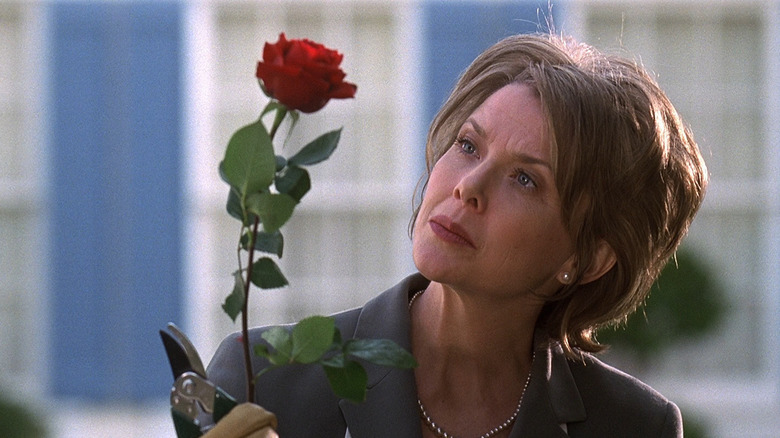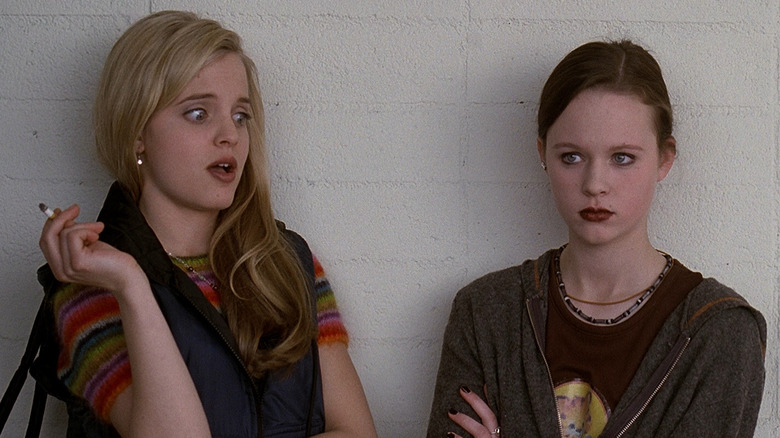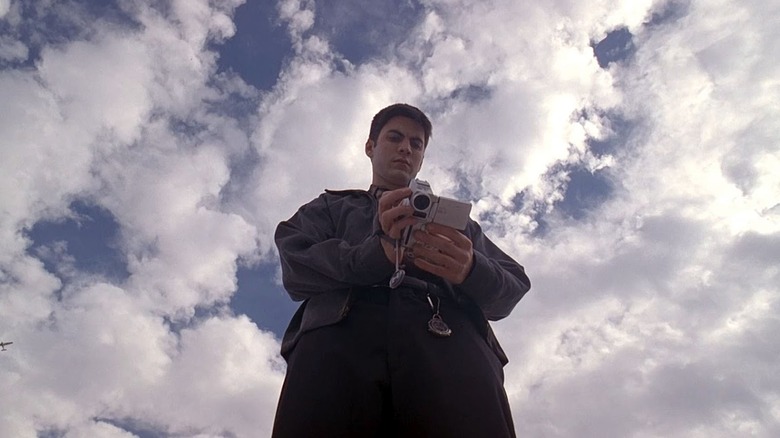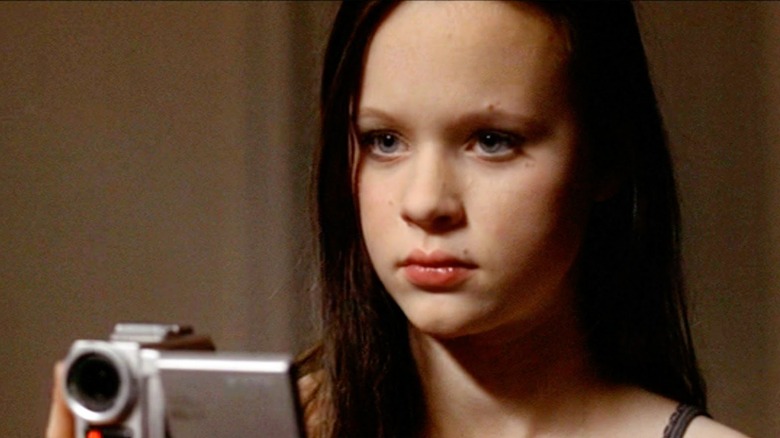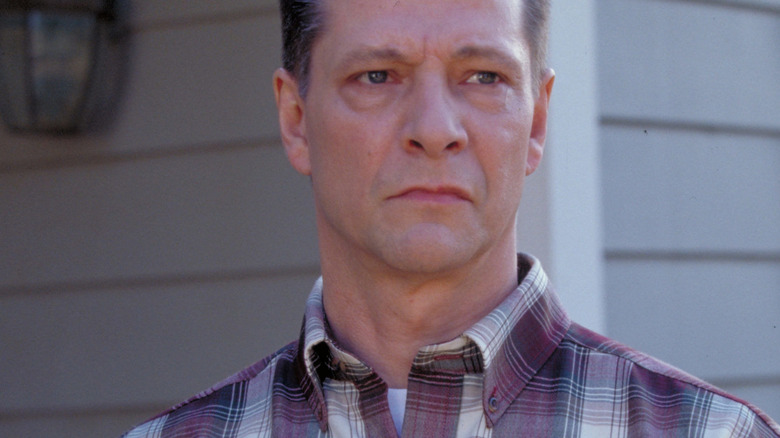American Beauty Ending Explained: The Cultural Dissatisfaction Of The Late 1990s
It's difficult to explain what a cultural juggernaut Sam Mendes' "American Beauty" was in 1999. It was considered groundbreaking, daring, and devastating. College kids would re-watch the film to absorb the overwhelming sense of ennui, and iconography from the film began to leak into the popular consciousness; one may recall a gag on "Family Guy" that lampoon's the dancing plastic bag scene in "American Beauty." The film won eight Academy Awards, including Best Picture, Best Screenplay, and Best Actor for Kevin Spacey. That last award may leave several readers stinging, as Spacey was accused by actor Anthony Rapp of sexual assault when Rapp was a teenager and Spacey was 26. At least 15 others came forward after that. Last May, Spacey was charged in court.
Spacey's presence in "American Beauty" isn't the only thing keeping the film at arm's length from modern audiences. It's also a film that deals explicitly with a type of cultural dissatisfaction unique to the late 1990s. Set in affluent suburbia, "Beauty" told the story of a middle-aged man named Lester in the midst of a severe midlife crisis. His wife (Annette Bening) is cold and distant, more interested in selling houses than in him. His teenage daughter (Thora Birch) is equally disconnected and is obsessed with potential cosmetic surgery. A new neighbor (Wes Bentley) offers marijuana to Lester, and his sexual interest in one of his daughter's teen friends (Mena Suvari) reawakens his zest for life.
At the time, Lester's lust for a teenager was indeed presented as supremely creepy — there is nothing in the film that advocates his gaze — but was also meant to be read as "daring" and "edgy." "American Beauty" was meant to disassemble a very particular popular notion of high-comfort living that was under intense scrutiny throughout the 1990s.
Way back in 1999
In order to understand "American Beauty," one must cast their mind back to the 1990s when Gen-X was rising into indifferent adulthood. Deconstruction was the word of the day, and a lot of popular entertainment was becoming self-aware and dismissive (see "Scream," or heck, even "Tiny Toon Adventures"). The film landscape had split open, and tiny zero-budget indie movies (from "Slacker" to "Clerks" all the way to "The Blair Witch Project") were becoming cultural mainstays better than some well-moneyed blockbusters. Kurt Cobain wore shirts excoriating "corporate magazines" on the cover of corporate magazines. The 1996 musical "Rent" was obsessed with finding art in the world without "selling out." On the radio, "alternative" rock became the preferred genre, offering an "alternative" to the pop garbage so dominant in the 1980s.
The central driving ethos of the time was that the world was no longer working, and the solution was to flee the mainstream, to become an outsider, to create your own art, to isolate from corporate culture and invent something new without its influence. This is a notion very far from the modern-day media landscape wherein entire fandoms swear blood oaths to well-moneyed studio products four times before breakfast.
Right at the end of the 1990s — it was released in mid-September — "American Beauty" became a button on the decade. A package intended to finally expose, once and for all, the phoniness of the 1950s American dream, which had been temporarily buoyed by the insufferable yuppie culture of the 1980s. Suburbia, the film shiftlessly, angrily spat, is finally dead.
Suburbia stripped bare
One might find, looking over a lot of popular media of the 1990s, a common theme of Suburban Hell. Tim Burton introduced a black-clad, blade-handed Goth into Suburbia ("Edward Scissorhands"). John Waters hid a serial killer in it ("Serial Mom"). Wes Craven populated it with kidnappers who have hostages ("The People Under the Stairs"). Ang Lee, looking back to the 1970s, pointed out that connubial bliss never existed ("The Ice Storm"). And don't get me started on Todd Solondz's amazing, harrowing film "Happiness." The best example may have been Gary Ross' 1998 film "Pleasantville," a fantasy film about modern teens magically transported into a placid, black-and-white sitcom from the 1950s. While inside, they introduce modern notions of art, independence, and sex, gradually infusing the world with beautiful, vibrant color. An obvious metaphor, but a potent one.
Suburbia, the 1990s declared, was a failed experiment at best, and a myth at worst. "American Beauty" showed — in striking fashion — that affluent neighborhoods were full of unhappiness. Marriages were falling apart, illegal lust lurked, would-be Nazis were hiding in plain sight, and the closet was still very much occupied. Murder, pain, death. Racism, homophobia. This is what the dream of post-WWII America fosters. The conservative mindset of the 1980s attempted to keep the dream alive, but after eight years of the Clinton administration, we had had enough.
The retreat, as represented in "Beauty" by the Bentley character, was isolation and entrepreneurship. Relying not on systems, but leaving them. Bentley made films led by his own sense of beauty and made money dealing (then-illegal) weed to locals. Late in the film, he hurriedly asks the Birch character to run away with him, to flee. She enthusiastically agrees.
The ending
As Birch and Bentley prepare to skip town, all the tensions that had been building up over the course of the movie come to a head. Lester is finally in a position to announce his lust for his teenage dream. Throughout the film, the Suvari character had touted her sexual agency, openly declaring details of her sex life to slightly startled peers. She reveals to Lester that her confidence was all a front, and that she is, indeed, a young person, beholden to the pressures given her by the gaze of men like him. She is young enough to be his daughter. Lester immediately regrets his decisions.
Meanwhile, Lester's stern neighbor — the father of the Bentley character, played by Chris Cooper — had misread certain conversations he and Lester had earlier in the film, taking them to mean that Lester was coming out as queer and that Cooper, too, should do the same. When Cooper does, it ignites his already hotly burning hate and inspires him to return to Lester with a gun. Lester's final narration is from the afterlife. It's Annette Bening who seems to get the short end of the stick. She had found her own catharsis earlier by having an affair with Peter Gallagher. After finding Lester dead, she wails in grief. It's her last moment in the movie. It might have been nice to see an extra moment of reflection from her.
And that's where "American Beauty" leaves us. Suburbia allows hatred to pullulate, success is a trap, everyone is full of deep dissatisfaction, and for some, death is the only way out.
Aging poorly
It didn't take too long for "American Beauty" to be critically reappraised, and it dated almost immediately. The "daring" and "edgy" aspects of the film just became uncomfortable and icky, and the messages of suburbia run amok were soon mocked for their mawkish obviousness. 20 years on, Stephanie Zacharek wrote a retrospective in Time Magazine, pointing out the irony of a film about escape and non-conformity being made in such an impeccably polished, "Hollywood conventional" style. "[I]t's one of the most laughably square movies about the destructiveness of conformity ever made," she wrote. She also cites the film's distantly dismissive and sarcastic tone.
Also, in the interim 20 years, a generation passed, the economy tanked, and wars began. The notion that one could happily leave wealth to pursue a dream making art became churlish, even foolish. "Selling out" became an abandoned bugbear as Millennials struggled to buy in as a means of survival. Watching a story about fleeing a dead-end office job isn't so inspiring when you don't have a job. Matthew Jacobs in the Huffington Post detailed the boom and the bust of "American Beauty's" cultural presence, pointing out how it started topping "most overrated" lists as early as 2005. By then, the luster was already gone.
Perhaps the thing that dates "American Beauty" is merely a sense of naïveté. In 1999, living in suburban Hell seemed to be about as bad as things could get in this country. "American Beauty" could not predict 9/11, or an economic crash, or the election of gibbering presidents who would haphazardly point the country toilet-ward. In 1999, audiences seemed to "get" it. It connected. It may be something from our past, but perhaps there's something in this film that we might still connect to.
